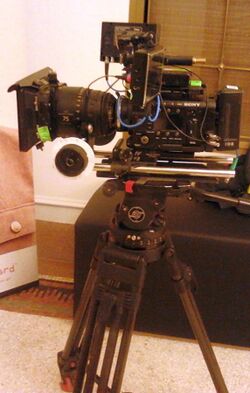Engineering:CineAlta
 | |
| Type | Video camera |
|---|---|
| Inception | 1999 |
| Manufacturer | Sony |
| Website | pro |
CineAlta cameras are a series of professional digital movie cameras produced by Sony that replicate many of the same features of 35mm film motion picture cameras.
Concept


CineAlta is a brand name used by Sony to describe various products involved in content creation, production and exhibition process within digital cinema workflow. Now Sony's products branded as CineAlta include camera, camcorder, recorder, cinema server, and projector. "CineAlta" is a portmanteau of Cine, from cinematography, and Alta, an Italian word for "high".[1]
Logo

The first CineAlta logo was designed by Hiroki Oka, Chief Art Director of Sony CreativeWorks Corporation, based at the Sony Atsugi Technology Center. The twinned ribbons represent the marriage of film and videotape, arranged in a way to deliberately evoke the infinity symbol, to symbolize the infinite possibilities.[1] The CineAlta logo was updated by Tetsuro Sano and applied for the first time to the F65.[2]
Format
CineAlta cameras record onto HDCAM tapes, XDCAM Professional Discs, SRMemory, or SxS flash memory cards. They have the ability to shoot at various frame rates including 24fps and a resolution of up to 8K. The camera can be used with a Miranda DVC 802 converter. This allows the camera to output SDI, DV, and multiple HD outputs.
History and use in motion pictures
In June 1999, George Lucas announced that Episode II of the Star Wars Prequel Trilogy would be the first major motion picture to be shot 100% digitally. Sony and Panavision had teamed up to develop the High Definition 24p camera that Lucas would use to accomplish this, and thus the first CineAlta camera was born: the Sony HDW-F900 (also called the Panavision HD-900F after being "panavised"). However, the science-fiction film Vidocq was actually the first released feature that was shot entirely with digital cinematography. Lucas held a private screening of Star Wars: Episode II – Attack of the Clones for the Atsugi Technology Center staff, and inserted a credit to specifically thank the Sony engineers at Atsugi for the use of the HDW-F900.[1]
For Star Wars: Episode III – Revenge of the Sith the more advanced Sony HDC-F950 was used, with higher resolution and better color reproduction than its predecessor. The film was cropped to a 2.40:1 aspect ratio from its native 16:9 frame. As a result, only 818 of the 1080 vertical pixels were actually used. An anamorphic adapter lens is available from Canon to allow shooting in 2.39:1 without losing any pixels. Manuel Huerga's Salvador is the first movie shot with this adapter.
2002's Russian Ark was recorded in uncompressed high definition video using a Sony HDW-F900. The information was recorded uncompressed onto a hard disk which could hold 100 minutes, thus allowing the entire film to be shot in a single 86 minute take. This was very complicated, as in 2002 there wasn't widely available technology for high capacity hard disk recording, and even less for doing this portably, on battery power, indoors and out from −23 °C (−9 °F) to 23 °C (73 °F). Four attempts were made to complete the shot, which had to be completed in one day due to the Hermitage Museum being closed for the shoot. The first three had to be interrupted due to technical faults, but the fourth attempt was completed successfully. Extra material on the DVD release includes a documentary on the technology used.

Other notable movies that were shot with CineAlta cameras include:
- Vidocq (2001, shot May 2000)
- All About Lily Chou-Chou (2001, shot August 2000)
- Session 9 (released 2001, shot September – October 2000)[3][4][5]
- Once Upon a Time in Mexico (released 2003, shot May 2001)[6]
- Burning Annie (released 2007, shot February 2002)[7]
- Spy Kids 2: The Island of Lost Dreams (2002)
- Spy Kids 3-D: Game Over (2003)
- Dogville (2003)
- Scacco pazzo (2003)
- Sky Captain and the World of Tomorrow (2004)
- The World (2004)
- Zebraman (2004)[8]
- Sin City (2005)[9]
- Caché (film) (2005)
- Crank (2006)
- U2 3D (2008)[10]
- Cloverfield (2008)
- Rachel Getting Married (2008)
- Yesterday Was a Lie (2008)
- Tetro (2009)
- Public Enemies (2009)
- Avatar (2009)
- Tron: Legacy (2010)
- Real Steel (2011)
- Just Go with It (2011)
- Shark Night 3D (2011)
- The Darkest Hour (2011)
- Sanctum (2011)
- The Sunset Limited (2011)
- Mirror Mirror (2012)
- Oblivion (2013)
- After Earth (2013)
- White House Down (2013)
- The Smurfs 2 (2013)
- Evil Dead (2013)
- Winter Sleep (2014)
- Lucy (2014)
- 6 Underground (2019)
- 21 Bridges (2019)
- Downton Abbey (2019)
- Harriet (2019)
- Two of Us (2019)
- Ma Rainey's Black Bottom (2020)
- The Life Ahead (2020)
- Unhinged (2020)
- Quo Vadis, Aida? (2020)
- Bad Boys for Life (2020)
- Tesla (2020)
- The Glorias (2020)
- I Care a Lot (2020)
- Parallel Mothers (2021)
- Coda (2021)
- Black Widow (2021)
- Annette (2021)
- Reminiscence (2021)
- The Mauritanian (2021)
- Cherry (2021)
- Wrath of Man (2021)
- Tom & Jerry (2021)
- Voyagers (2021)
- Peter Rabbit 2: The Runaway (2021)
- Cherry (2021)
- Kate (2021)
- Top Gun: Maverick (2022)
- Hustle (2022)
- Spiderhead (2022)
- The Man From Toronto (2022)
- The Gray Man (2022)
- Do Revenge (2022)
- Weird: The Al Yankovic Story (2022)
- Black Panther: Wakanda Forever (2022)
- Avatar: The Way of Water (2022)
- Matilda the Musical (2022)
- Creed III (2023)
- Tetris (2023)
- Ghosted (2023)
- Beau is Afraid (2023)
- The Pope's Exorcist (2023)
- Mission: Impossible – Dead Reckoning Part One (2023)
- Strays (2023)
- Gran Turismo (2023)
List of CineAlta cameras
All cameras are made by Sony except where noted:
- BURANO (2023)
- VENICE 2 (2021)[11]
- VENICE (2017)[12]
- F55/F5 (2014)[13]
- NEX-FS700 (2011)[14]
- F65 (2011)[13]
- PMW-F3 (2010)[15]
- SRW-9000PL (2010)[16]
- PMW-500 (2010)[17]
- PDW-F800/700 (2008–2009)[17]
- F35/F23 (2008)[18]
- PMW-EX3 (2008)[19]
- PMW-EX1/EX1R (2006, EX1R in 2009)[19]
- HDW-F900R (2006)[20]
- PDW-F350/F330 (2006)[21]
- HDC-F950 (2003)[22]
- HDW-F900 (2000)[23]
| Model | Weight | Size[lower-alpha 1] | Sensor | Lens mount | Media | Framerates | Introduced | Current |
|---|---|---|---|---|---|---|---|---|
| HDW-F900[23] | 18 lb 8 kg[lower-alpha 2] |
5.5 in × 10.4 in × 15.0 in 140 mm × 265 mm × 380 mm |
3×2⁄3" CCD |
B4 | HDCAM | 24,25,30 (1080p) 50,60 (1080i) |
2000 | |
| HDC-F950[22] | 11 lb 5.1 kg |
5.2 in × 10.9 in × 14.2 in 133 mm × 276 mm × 360 mm |
3×2⁄3" CCD |
B4 | [lower-alpha 3] | 24 (1080p) | 2003 | |
| HDW-F900R[20] | 12 lb 5.4 kg[lower-alpha 2] |
5.0 in × 10.6 in × 13.6 in 127 mm × 269 mm × 345 mm |
3×2⁄3" CCD |
B4 | HDCAM | 24,25,30 (1080p) 50, 60 (1080i) |
2006 | |
| PDW-F350[21] | 8.5 lb 3.85 kg[lower-alpha 4] |
4.9 in × 10.6 in × 12.9 in 124 mm × 268 mm × 328 mm |
3×1⁄2" CCD |
Sony 1⁄2" bayonet | XDCAM PFD | 4–60 (1080p) | 2006 | |
| PDW-F330[21] | 24,25,30 (1080p) 50,60 (1080i) | |||||||
| PMW-EX1/EX1R[19][24] | 5.3 lb 2.4 kg[lower-alpha 5] |
7.01 in × 6.93 in × 12.26 in 178 mm × 176 mm × 311.5 mm[lower-alpha 6] |
3×1⁄2" CMOS |
Fixed | 2×SxS | 1–30 (1080p) 1–60 (720p) |
2007[25][lower-alpha 7] | |
| PMW-EX3[19] | 4.2 lb 1.9 kg[lower-alpha 8] |
9.8 in × 8.3 in × 15.7 in 250 mm × 210 mm × 400 mm[lower-alpha 6] |
EX-mount | 2008 | ||||
| F23[18] | 11.0 lb 5.0 kg |
7.85 in × 8.62 in × 7.79 in 199.3 mm × 219 mm × 197.8 mm |
3×2⁄3" CCD |
B4 | [lower-alpha 9] | 1–60 (1080p)[lower-alpha 10] | 2007[26] | |
| F35[18] | 1×Super 35 CCD |
PL | 1–50 (1080p)[lower-alpha 10] | 2008 | ||||
| PDW-700[17] | 9.5 lb 4.3 kg[lower-alpha 11] |
4.9 in × 10.6 in × 13.1 in 124 mm × 269 mm × 332 mm |
3×2⁄3" CCD |
B4 | XDCAM PFD | 24,25,30 (1080p) 50,60 (1080i) |
2008[27] | |
| PDW-F800[17] | 1–60 (1080p) | 2009[28] | ||||||
| PMW-500[17][29] | 7.5 lb 3.4 kg |
2×SxS | 1–30 (1080p) 1–60 (720p) |
2010[30] | ||||
| SRW-9000PL[16] | 15 lb 6.9 kg[lower-alpha 12] |
5.8 in × 8.3 in × 13.0 in 148 mm × 211 mm × 330 mm |
1×Super 35 CCD |
PL | HDCAM-SR[lower-alpha 13] | 24,25,30 (1080p) 50, 60 (1080i)[lower-alpha 14] |
2010[31][32] | |
| F3[15][lower-alpha 15] | 5.3 lb 2.4 kg |
5.9 in × 7.4 in × 8.3 in 151 mm × 189 mm × 210 mm |
1×Super 35 CMOS |
FZ[lower-alpha 16] | 2×SxS[lower-alpha 13] | 1–30 (1080p) 1–60 (720p) |
2010[33] | |
| F65[13] | 11.0 lb 5.0 kg[lower-alpha 17] |
8.9 in × 8.0 in × 8.1 in 227 mm × 203 mm × 205 mm |
1×Super 35 CMOS |
PL | SRMemory[lower-alpha 18] | 1–60 (8K) 1–120 (4K) |
2011[34] | |
| NEX-FS700[14] | 3.7 lb 1.68 kg[lower-alpha 19] |
5.71 in × 7.03 in × 9.27 in 145 mm × 178.5 mm × 235.5 mm |
1×Super 35 CMOS |
E | MS PRO Duo, SD/SDHC/SDXC[lower-alpha 20] | 1–240 (1080p) | 2012[35] | |
| F5[13] | 4.9 lb 2.2 kg |
5.1 in × 4.9 in × 7.5 in 130 mm × 125 mm × 191 mm |
1×Super 35 CMOS |
FZ[lower-alpha 16] | 2×SxS, AXSM[lower-alpha 21] | 1–60 (4K)[lower-alpha 22] 1–240 (2K)[lower-alpha 23] |
2012[36] | |
| F55[13] | ||||||||
| VENICE[12][lower-alpha 24] | 8.6 lb 3.9 kg |
5.2 in × 6.3 in × 6.8 in 133 mm × 159 mm × 172 mm |
1×Full Frame[lower-alpha 25] CMOS |
E[lower-alpha 16][lower-alpha 26] | 2×SxS, 2×AXSM[lower-alpha 27] | 1–30 (6K) 1–60 (4K) |
2017[37] | |
| VENICE 2 (8.6K)[11][lower-alpha 28] | 9.5 lb 4.3 kg |
6.0 in × 6.2 in × 9.8 in 152 mm × 158 mm × 250 mm |
1×Full Frame[lower-alpha 25] CMOS |
E[lower-alpha 16][lower-alpha 26] | 2×AXSM | 1–30 (8.6K) 1–90 (5.8K) |
||
| VENICE 2 (6K)[11][lower-alpha 29] | 9.3 lb 4.2 kg |
1–90 (6K) 1–110 (4K) | ||||||
| BURANO[38][lower-alpha 30] | 5.3 lb 2.4 kg |
5.74 in × 5.61 in × 8.59 in 145.7 mm × 142.5 mm × 218.1 mm |
1×Full Frame[lower-alpha 25] CMOS |
E[lower-alpha 16][lower-alpha 26] | 2×CFexpress Type B | 24,25,30 (8.6K) 24,25,30,50,60 (6K) 24,25,30,50,60,100,120 (4K) |
2023 |
- Notes
- ↑ Width × Height × Depth, excluding lenses and protrusions
- ↑ 2.0 2.1 Including lens, battery, and cassette
- ↑ No onboard recording. Connects to SRW-5000 HDCAM or SRW-1 HDCAM-SR videocassette recorders.
- ↑ Approximately 12 lb (5.4 kg) with viewfinder, microphone, Professional Disc, and battery
- ↑ Approximately 6.2 lb (2.8 kg) with battery and SxS card.
- ↑ 6.0 6.1 With lens.
- ↑ EX1R announced in 2009 with upgraded features.
- ↑ Approximately 7.9 lb (3.6 kg) with lens, battery and SxS card.
- ↑ No onboard recording. Connects to SRW-1 HDCAM-SR videocassette recorder. Solid state SRMemory compatible via dockable SR-R1.
- ↑ 10.0 10.1 Requires HKSR-102 to be installed in SRW-1 for 50/60fps in 4:2:2 mode; requires both HKSR-102 and HKSR-103 for 50/60fps in 4:4:4 mode.
- ↑ 13.2 pounds
6.0 kilograms with battery, viewfinder, and microphone. - ↑ Including lens, battery, and cassette
- ↑ 13.0 13.1 Attaches to SR-R1 via HD-SDI to allow recording to solid state SRMemory.
- ↑ Variable frame rate 1–60 fps when HKSR-9002 Picture Cache Board is installed.
- ↑ Available as a kit (with 35mm, 50mm, 85mm T2.0 PL-mount prime lenses, PMW-F3K) and bare body (PMW-F3L)
- ↑ 16.0 16.1 16.2 16.3 16.4 PL with included adapter
- ↑ 14 lb (6.5 kg) with accessories
- ↑ Via external docking recorder SR-R4.
- ↑ 6.7 lb (3.06 kg) with lens, battery, microphone, handle, viewfinder.
- ↑ AXSM via optional AXS-R5 recorder and HXR-IFR5 interface units.
- ↑ Via external docking recorder AXS-R5.
- ↑ F5 requires optional upgrade for 4K in XAVC.
- ↑ Limited to 180fps when recording in 2K XAVC
- ↑ Model number MPC-3610
- ↑ 25.0 25.1 25.2 36 mm × 24 mm (1.42 in × 0.94 in) sensor size.
- ↑ 26.0 26.1 26.2 Lever-lock variant of E-mount, which allows the rotation of a lever, rather than the lens.
- ↑ Via external docking recorder AXS-R7.
- ↑ Model number MPC-3628
- ↑ Model number MPC-3626
- ↑ Model number MPC-2610
See also
- Sony camcorders
- Digital cinematography
- Panavision HD-900F
- PMW-EX1
- AXIOM (camera)
References
- ↑ 1.0 1.1 1.2 "Feature Design: "CineAlta" Digital Cinema Camera F23". Sony. 13 June 2007. https://www.sony.net/Fun/design/activity/product/f23_03.html.
- ↑ "Feature Design: "CineAlta" Digital Cinema Camera F65". Sony. 11 June 2012. https://www.sony.net/Fun/design/activity/product/f65/03.html.
- ↑ "Session 9 Budget / Box Office / Filming Dates, IMDB". https://www.imdb.com/title/tt0261983/business?ref_=tt_dt_bus.
- ↑ "Session 9 Technical Specifications, IMDB". https://www.imdb.com/title/tt0261983/technical.
- ↑ "Review: 'Session 9', Variety". https://variety.com/2001/film/reviews/session-9-1200469568/.
- ↑ "Once Upon a Time in Mexico Technical Specifications, IMDB". https://www.imdb.com/title/tt0285823/technical.
- ↑ "MovieMaker: How They Did It 'Burning Annie'". https://www.moviemaker.com/archives/series/how_they_did_it/burning-annie-found-self-distribution-after-a-decade-of-catastrophes.
- ↑ "Zebraman Technical Specifications, IMDB". https://www.imdb.com/title/tt0388556/technical.
- ↑ "HD World: The World of High Definition, Created by Sony" (PDF). http://www.sony.net/SonyInfo/IR/financial/ar/2006/qfhh7c00000aksu2-att/qfhh7c00000aksvf.pdf.
- ↑ Goldstein, Gregg (2006-10-31). "Mysterious ways: U2 in 3-D concert film". The Hollywood Reporter. http://www.hollywoodreporter.com/hr/content_display/film/news/e3iSvX2Mh9HIlJOpHjDRwrDbQ%3D%3D.
- ↑ 11.0 11.1 11.2 "VENICE 2". Sony. https://pro.sony/s3/2021/11/17140442/MK20467V2_Web_h.pdf.
- ↑ 12.0 12.1 "VENICE". Sony. https://pro.sony/s3/cms-static-content/uploadfile/61/1237495194461.pdf.
- ↑ 13.0 13.1 13.2 13.3 13.4 "CineAlta Catalog 2015". Sony. https://pro.sony/s3/cms-static-content/uploadfile/47/1237494512347.pdf.
- ↑ 14.0 14.1 "NEX-FS700: Full-HD Super Slow Motion NXCAM Camcorder". Sony. https://pro.sony/s3/cms-static-content/file/28/1237486157828.pdf.
- ↑ 15.0 15.1 "PMW-F3L". Sony. https://pro.sony/en_GB/products/handheld-camcorders/pmw-f3l.
- ↑ 16.0 16.1 "SRW-9000PL". Sony. https://pro.sony/en_EE/products/digital-cinema-cameras/srw-9000pl.
- ↑ 17.0 17.1 17.2 17.3 17.4 "XDCAM HD422 Family". Sony. https://pro.sony/s3/cms-static-content/file/55/1237485213955.pdf.
- ↑ 18.0 18.1 18.2 "Digital Cinematography Camera F35 / F23". Sony. https://pro.sony/s3/cms-static-content/file/59/1237485155859.pdf.
- ↑ 19.0 19.1 19.2 19.3 "XDCAM EX". Sony. https://pro.sony/s3/cms-static-content/file/65/1237485216665.pdf.
- ↑ 20.0 20.1 "HDW-F900R Sony Digital Camcorder". Sony. 2006. https://pro.sony/s3/cms-static-content/brochures/HDW-F900R.pdf.
- ↑ 21.0 21.1 21.2 "XDCAM HD Professional Disc System". Sony. http://bssc.sel.sony.com/BroadcastandBusiness/docs/brochures/v-2320.pdf.
- ↑ 22.0 22.1 "Sony Digital 4:4:4 HD Camera System HDC-F950 / HDCU-F950". Sony. 2003. http://bssc.sel.sony.com/BroadcastandBusiness/docs/brochures/hdc-f950.pdf.
- ↑ 23.0 23.1 "HDW-F900 Sony Digital Camcorder". Sony. 2006. https://cinequipt.com/cms-files/sony-hdw-f900-brochure.pdf.
- ↑ "Full HD solid-state camcorder. PMW-EX1R". Sony. https://pro.sony/s3/cms-static-content/file/44/1237485157844.pdf.
- ↑ Young, Rick (23 October 2009). "Sony announces replacement for the PMW-EX1". Network World. https://www.networkworld.com/article/2252403/smb/sony-announces-replacement-for-the-pmw-ex1.html.
- ↑ "[Inter BEE 2006]Sony reveals a new lineup for accelerating HD World" (Press release). Sony. November 15, 2006. Retrieved 30 September 2008.
- ↑ Stuart, Mark (April 2008). "XDCAM HD: Sony's 2/3rd-inch XDCAM HD PDW-700 is here". DVuser Magazine: 6–12. http://www.dvuser.co.uk/images/magazine/back-issues/issue-9.pdf. Retrieved 30 September 2018.
- ↑ Frazer, Bryant (19 April 2009). "Sony Stretches XDCAM HD, HDCAM SR Offerings at NAB". Studio Daily. http://www.studiodaily.com/2009/04/sony-stretches-xdcam-hd-hdcam-sr-offerings-at-nab/.
- ↑ "PMW-500 Solid-State Memory Camcorder". Sony. https://pro.sony/s3/cms-static-content/file/01/1237489668401.pdf.
- ↑ Frazer, Bryant (10 September 2010). "Sony Introduces XDCAM PMW-500, Recording 4:2:2 HD to SxS Memory Cards". Studio Daily. http://www.studiodaily.com/2010/09/sony-introduces-xdcam-pmw-500-recording-422-hd-to-sxs-memory-cards/.
- ↑ Schubin, Mark (September 2010). "Electronic Image Acquisition Progress Report". SMPTE Motion Imaging Journal 119 (6): 67–69. doi:10.5594/J12201. https://ieeexplore.ieee.org/document/7269863. Retrieved 30 September 2018.
- ↑ "Sony SRW-9000PL". Film and Digital Times: 21. https://www.cinec.de/global/downloads/pressespiegel/2010/FDTimes-Sept2010-Cinec.pdf?m=1487949772. Retrieved 30 September 2018.
- ↑ Wilt, Adam (November 10, 2010). "Sony PMW-F3 Announced". Pro Video Coalition. https://www.provideocoalition.com/sony_pmw-f3_announced/.
- ↑ "Sony Launches F65 CineAlta Camera and Unveils End-to-End 4K Workflow for Digital Cinematography" (Press release). Sony. 6 September 2011. Archived from the original on 24 September 2018. Retrieved 23 September 2018.
- ↑ "Sony announces NEX-FS700 '4k-ready' E-mount camcorder". Digital Photography Review. 2 April 2012. https://www.dpreview.com/articles/6772362590/sony-4k-ready-nex-fs700-fs700e-camcorder.
- ↑ Murie, Michael (31 October 2012). "Sony Announces F5, F55 and Other Toys". Filmmaker Magazine. https://filmmakermagazine.com/57288-sony-announces-f5-f55-and-other-toys/.
- ↑ Allard, Matthew (6 September 2017). "Sony unveils VENICE – 36x24mm full-frame digital motion picture camera system". News Shooter. https://www.newsshooter.com/2017/09/06/sony-unveils-venice-36x24mm-full-frame-digital-motion-picture-camera-system/.
- ↑ "BURANO". Sony. https://pro.sony/ue_US/products/digital-cinema-cameras/burano.
External links
- Official CineAlta page
- Sony Professional
- Sony's first global news release of F35
- Sony US's announcement with information of CineAlta 4K
pl:Sony Cinealta
 |
